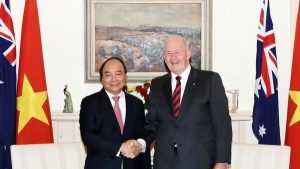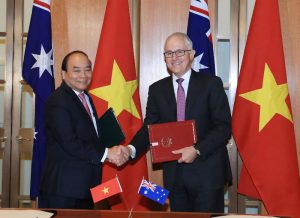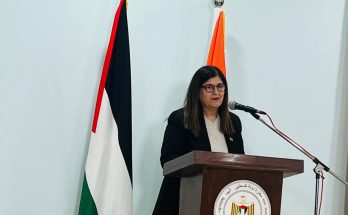 The geo-political scene in the Indo-Pacific region is changing rapidly in over the last couple of years. The driving force behind these changes is the rise of China, together with its assertiveness on territorial issues, particularly its claim on most parts of South China Sea in the midst of rival claims from some other countries of the region, namely Vietnam, Malaysia, Brunei and, of course Taiwan that claims everything that mainland China does.
The geo-political scene in the Indo-Pacific region is changing rapidly in over the last couple of years. The driving force behind these changes is the rise of China, together with its assertiveness on territorial issues, particularly its claim on most parts of South China Sea in the midst of rival claims from some other countries of the region, namely Vietnam, Malaysia, Brunei and, of course Taiwan that claims everything that mainland China does.
Indonesia, however, is not a claimant to South China, but the so-called Nine-dash line that Beijing uses to lay its claim on South China touches the Natuna Island that belongs to Jakarta. To bolster its claims on the South China Sea, Beijing has built artificial island and militarized them posing a threat to the security of some of the smaller countries in the region. To extend its geo-political and geo-economic imprint not only on the Indo-Pacific region, but also in the entire world, it has now initiated its OBOR (Belt and Road) initiative with its connectivity, both land and maritime, and infrastructure development projects that has practically led to the economic strangulation and some kind of a debt-trap of most countries in the region.
India-Vietnam Connect
 To respond to such a development, the countries in the region have also been swift in either band-wagoning or balancing the Chinese-inspired regional order. In recent months we have witnessed the commemoration of 25 years of India-ASEAN engagement and the signing of a Delhi Declaration outlining the strategic partnership between them, followed by the visit of Vietnamese President to India and signing of number of agreements between the two countries further strengthening the already existing, political, defence and security cooperation and Hanoi’s capacity-building to meet challenges to its territorial integrity and sovereignty.
To respond to such a development, the countries in the region have also been swift in either band-wagoning or balancing the Chinese-inspired regional order. In recent months we have witnessed the commemoration of 25 years of India-ASEAN engagement and the signing of a Delhi Declaration outlining the strategic partnership between them, followed by the visit of Vietnamese President to India and signing of number of agreements between the two countries further strengthening the already existing, political, defence and security cooperation and Hanoi’s capacity-building to meet challenges to its territorial integrity and sovereignty.
Vietnamese President Tran Dai Quang’s March 2-4 visit to India and his talks with Prime Minister Narendra Modi have deepened maritime security partnership in the Indo-Pacific region between India and Vietnam to promote an open, transparent, inclusive and rules-based regional architecture.
In a joint statement, India and Vietnam reaffirmed their support for freedom of navigation in the South China Sea. The leaders of India and Vietnam “reiterated the importance of achieving a peaceful and prosperous Indo-Pacific region where sovereignty and international law, freedom of navigation and overflight, sustainable development and a free, fair and open trade and investment system are respected,” said the joint statement.
India-Australia strategic connect
 The latest in this process of balancing the Chinese hegemony in the region is the Joint Statement on establishment of Vietnam-Australia strategic partnership. Prime Minister Nguyen Xuan Phuc and a high-ranking delegation of Vietnam had paid an official visit to Australia and attending the ASEAN-Australia Special Summit from March 14-18 that coincided with the visit. On March 15, the two sides issued a joint statement on the establishment of a strategic partnership between Vietnam and Australia.
The latest in this process of balancing the Chinese hegemony in the region is the Joint Statement on establishment of Vietnam-Australia strategic partnership. Prime Minister Nguyen Xuan Phuc and a high-ranking delegation of Vietnam had paid an official visit to Australia and attending the ASEAN-Australia Special Summit from March 14-18 that coincided with the visit. On March 15, the two sides issued a joint statement on the establishment of a strategic partnership between Vietnam and Australia.
Incidentally, 2018 marks the 45th anniversary of diplomatic relations between Vietnam and Australia, and the two countries decided use the occasion to elevate the bilateral relationship to the level of a Strategic Partnership, a development that was already agreed upon in November last year when Prime Minister of Australia, Turnbull visited Danang for the Asia-Pacific Economic Cooperation Summit, reflecting the two countries’ mature and diverse bilateral relationship encompassing wide-ranging cooperation of political issues, trade and investment, education, defence and security, policing immigration and combining transnational crime, people smuggling and human trafficking.
The two leaders also reached consensus on the significance of ensuring peace, stability, security, and safety, freedom of navigation and over flight in the East Sea, and settling disputes on the basis of international law, including the 1982 UN Convention on the Law of the Sea (UNCLOS).
They also showed their support for the early conclusion of a legally-binding Code of Conduct in the East Sea (COC). As usual, the two countries emphasized ASEAN centrality in the evolving regional architecture and resolved to work together to strengthen ASEAN-led mechanisms such as the East Asia Summit (EAS), ASEAN Regional Forum (ARF), the ASEAN Defence Ministers’ Meeting Plus (ADMM ), with ASEAN as the driving force. Furthermore, they affirmed the importance of the EAS as the premier leaders-led regional forum for dialogue and cooperation on strategic, political and economic issues of common interest and concern.
Shaping balanced regional order
At the root of this strategic partnership is their desire to create a more ‘secure and open region’ that matches with the very objective of India to create an open, inclusive and transparent Indo-Pacific regional order. This is also the objective of the recently revived concept of a QUAD, comprising Australia, United States, Japan and India. In November, representatives from both India and Australia participated in a working-level quadrilateral meeting with representatives from Japan and the United States.
Quad Factor
This so-called “Quad” had originally met in 2007 and the latest meeting focused on the concept of a “free and open Indo-Pacific,” an idea that all four sides backed in statements released after the working-level meeting. Unsurprisingly, the India-Australia two-plus-two meeting referenced the idea: “Both sides agreed that a free, open, prosperous and inclusive Indo-Pacific region serves the long-term interests of all countries in the region and of the world at large,” the Indian Ministry of External Affairs noted in its statement.
The Vietnam-Australia joint statement reaffirms Vietnam’s acceptance of such an arrangement to balance China’s overwhelming strategic and economic influence in the region, and possibly its own inclusion within the arrangement sometimes in the near future. And the fact that joint statement refers to an open region also means the two countries respect a rule-based international and maritime order in the region and does not impede free trade, particularly in the South China Sea.
“We reaffirm the importance of maintaining and promoting peace, stability, maritime safety and security, freedom of navigation and overflight in the region. We emphasise the importance of non-militarisation and the need to enhance mutual trust and confidence, exercise self-restraint in the conduct of activities and avoid actions that may complicate the situation,” said the Sydney Declaration.
“We reaffirm the need for states to pursue the peaceful resolutions of disputes, in accordance with universally recognised principles of international law, including the 1982 United Nations Convention on the Law of the Sea (UNCLOS), and to comply with the relevant standards and recommended practices by the International Civil Aviation Organization (ICAO) and the International Maritime Organization (IMO).”
“In this regard, we support the full and effective implementation of the Declaration on the Conduct of the Parties in the South China Sea (DOC) in its entirety and look forward to an early conclusion of an effective Code of Conduct in the South China Sea (COC),” said the declaration.
Interestingly, Australia itself is troubled by its over-dependence on China on economic matters and also resent Beijing’s interference in its domestic politics. Australia’s search for friends is also a function of uncertainty of America’s role in the region, particularly under the Trump administration and the President’s erratic statements and actions. As a result Canberra is trying to develop closer interactions with other Asian countries, particularly India to balance Beijing’s influence. On regional security matters, India and Australia have seen a fair bit of convergence recently. The two countries conduct bilateral naval exercises in the Indian Ocean. In 2017, Australia, despite its interest, did not participate in the Malabar drills, owing to Indian hesitation. The Indian Navy nevertheless joined its Australian counterpart for the AUSINDEX drill this year. In 2017, Australian Prime Minister Malcolm Turnbull visited New Delhi for a four-day state visit, where he met with his Indian counterpart Narendra Modi. The joint statement released by the two leaders during that visit, which described them as “partners in the Indo-Pacific,” focused considerably on regional issues.
The two countries iterated the importance of stability and security of Indo-Pacific region through which important Sea Lines of Communication (SLOCs) pass. Obliquely hinting at increasingly assertive China in the South China Sea, the joint statement said: “Recognizing that an economically prosperous Indo-Pacific region is underpinned by stability and security, the two leaders underscored the importance of respecting the maritime legal order based on the 1982 United Nations Convention on the Law of the Sea (UNCLOS).”
The strengthening of Vietnam-Australia relations and India-Australia relations together offers an alternative narrative to China’s view of the regional order.
(Prof. Baladas Ghoshal is Secretary General, Society for Indian Ocean Studies)
Author Profile
- India Writes Network (www.indiawrites.org) is an emerging think tank and a media-publishing company focused on international affairs & the India Story. Centre for Global India Insights is the research arm of India Writes Network. To subscribe to India and the World, write to editor@indiawrites.org. A venture of TGII Media Private Limited, a leading media, publishing and consultancy company, IWN has carved a niche for balanced and exhaustive reporting and analysis of international affairs. Eminent personalities, politicians, diplomats, authors, strategy gurus and news-makers have contributed to India Writes Network, as also “India and the World,” a magazine focused on global affairs.
Latest entries
 DiplomacyJanuary 5, 2026India walks diplomatic tightrope over US operation in Venezuela
DiplomacyJanuary 5, 2026India walks diplomatic tightrope over US operation in Venezuela India and the WorldNovember 26, 2025G20@20: Africa’s Moment – The Once and Future World Order
India and the WorldNovember 26, 2025G20@20: Africa’s Moment – The Once and Future World Order DiplomacyOctober 4, 2025UNGA Resolution 2758 Must Not Be Distorted, One-China Principle Brooks No Challenge
DiplomacyOctober 4, 2025UNGA Resolution 2758 Must Not Be Distorted, One-China Principle Brooks No Challenge India and the WorldJuly 26, 2025MPs, diplomats laud Operation Sindoor, call for national unity to combat Pakistan-sponsored terror
India and the WorldJuly 26, 2025MPs, diplomats laud Operation Sindoor, call for national unity to combat Pakistan-sponsored terror







